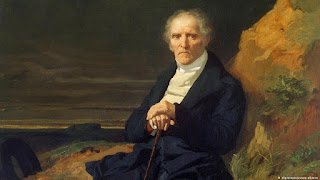Whether you are a writer or you’re involved in another art, it can be difficult to make the transition from one major project to another. That is particularly the case when an artist has gotten some recognition for a series that took years to create. There is tremendous satisfaction in finishing a body of work, but that completion also poses a question: How can you now equal or improve on the originality and power of your last project?
And what if you’re not fully satisfied with your most recent works? What if time has now given you the distance to see the flaws or shortcomings of your previous creations? Now that you realize how high the bar is set, how can you trust yourself to do better in the future, if that’s the peak you reached last time?
All those self doubts can be paralyzing for an artist. How do you get past them?
One useful answer for these dilemmas is in the work of the French utopian socialist Charles Fourier (1772–1837).
 |
| Charles Fourier |
“The alternating or butterfly [passion] is the need for regular variety, contrasting situations, change of scenery, spicy encounters, and novelties that give rise to fantasies, that stimulate both the senses and the soul….[The butterfly passion] is the agent of universal transition, the principle of liberty…”
—Charles Fourier, The Theory of the Four Movements
When you get stuck between projects, set loose your creative butterfly. Allow your thoughts to flit to every possible flowering of your imagination. Enjoy the process of generating different ideas that take on colors and shapes you’ve never before considered.
If you’re stuck after a big project, it can be extremely tempting to repeat what you’ve done in the past, particularly if you’ve gotten praise and acclaim for recent work. But there is nothing deadlier for art than repetition. You have to cut the ropes that dock you to past successes and failures and set sail, even if there is no land in sight yet. You’re actually in much better shape to complete your next project successfully, because you now have the knowledge you’ve carefully collected throughout your career in the arts.
Zack’s most recent book of poems, Irreverent Litanies
Other posts of interest:
Getting the Most from Your Writing Workshop
How Not to Become a Literary Dropout
Putting Together a Book Manuscript
Does the Muse Have a Cell Phone?
Poetic Forms: Introduction, the Sonnet, the Sestina, the Ghazal, the Tanka, the Villanelle
